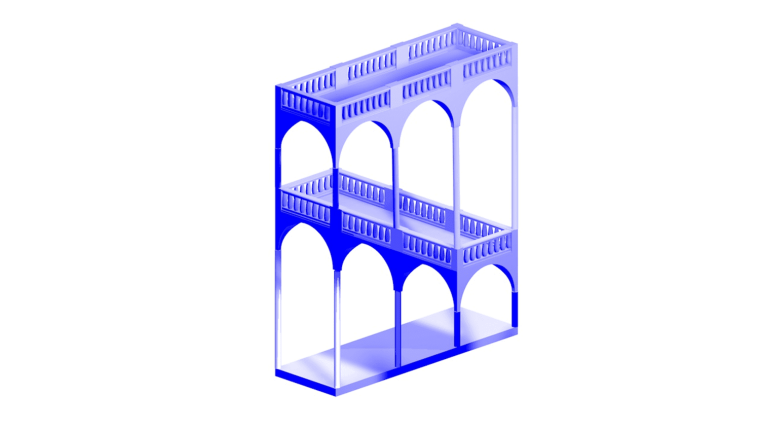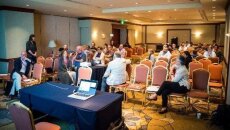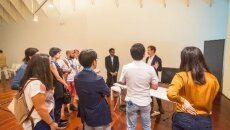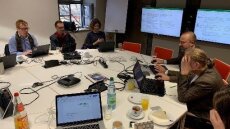
Digital 3D reconstructions have been used as knowledge carriers, research tools and means of representation in architectural history research for more than 30 years. On the one hand, the number of produced digital reconstructions has continuously increased in the past years, on the other hand, they show highly different technical, graphical and content-related qualities. In addition, in most cases neither the processes of creation nor the quality of the underlying research work are transparent. While a diversity of models and tools is desirable, especially due to the plurality of questions that are investigated using them, the question of criteria and approaches to evaluate and validate the use of these tools as well as the resulting findings arises.
The specific question is: How can digital reconstruction methods be validated as scientific tools in the context of architectural history research?
An initial set of topics and related sets of questions were developed with the involvement of about 30 scholars in a workshop of the "Arbeitsgemeinschaft Digitale Rekonstruktion des Digital Humanities im deutschsprachigen Raum (DhD) e.V." at the end of 2014. The participants of the network deal with the following main topics within the framework of six working meetings:
The results of the work are incorporated into jointly developed guidelines as well as a "Handbook of Scientific Digital 3D Reconstruction" based on them.
The network is in place since 2018.
About the format
Scientific networks offer young researchers the opportunity for cross-location, topic- and task-related exchange.
A scientific network consists of a permanent group of people who work on a specific topic over a defined period of several years - up to three years - with the aim of achieving a concrete result. This group of people can also include researchers working abroad, the aim being that scientific networks should also serve the international networking of young researchers.
http://External linkwww.dfg.de/foerderung/programme/einzelfoerderung/wissenschaftliche_netzwerke/index.htmlExternal link
Network members
|
# |
Expertise |
Person |
Institution |
|
|
Art History |
|
|
|
1 |
Approaches of the visual sciences |
Dr. Georg Schelbert |
Humboldt-Universität Berlin |
|
2 |
Digital Methods in Art History |
Jan-Eric Lutteroth |
Ludwig Maximilian Universität München |
|
3 |
Approaches of the history of architecture |
Dr. Richard Kurdiowsky |
AdW Wien |
|
4 |
Approaches of art history |
Dr. Heike Messemer |
Julius-Maximilians-Universität Würzburg |
|
5 |
Digital methods in architectural history |
Dr. Peter-Heinrich Jahn |
Technische Universität Dresden |
|
|
Qualitities of the digital reconstruction |
|
|
|
6 |
Docuumentation |
Dr.-Ing. Marc Grellert |
Technische Universität Darmstadt |
|
7 |
Data modelling |
Prof. Dr.-Ing. Piotr Kuroczynski |
Hochschule Mainz |
|
8 |
Workinng processes |
Dr. Sander Münster |
Technische Universität Dresden |
|
9 |
Presentation |
Prof. Fabrizio I. Apollonio |
Università di Bologna |
|
|
Related disciplines |
|
|
|
10 |
Computer Science |
Dr.-Ing. Florian Niebling |
Julius-Maximilians-Universität Würzburg |
|
11 |
Digital Cultural Heritage |
Dr.-Ing. Marinos Ioannides |
Cyprus University of Technology |
|
12 |
Data Science |
Dr. Ina Blümel |
TIB Hannover |
Previous meetings
|
Zeitpunkt |
Inhalte |
|
14./15. 11. 2018 |
Kick-off and basic agreements on the networking activities Opening: Locating and systematising digital reconstruction as a research tool Venue: Wien, Host: CHNT |
|
1. Q. 2019 |
Wrap-up: The location and systematisation of digital reconstruction as a research tool Opening: Scientific-critical understanding of methods Venue: Mainz, Host: HS Mainz |
|
3. Q. 2019 |
Closing: Scientific-critical understanding of methods Opening: Documentation Venue: Jena, Host: FSU Jena |
|
2. Q. 2020 |
Closing: Documentation Opening: Presentation and discourse integration of digital 3D reconstructions Venue: Virtual, Host: U. Bologna |
|
1. Q. 2021 |
Closing: Presentation and discourse integration of digital 3D reconstructions. Opening: Standards and guidelines Venue: Virtual, Host: Cyprus U. Technology |
|
3. Q. 2021 |
Closing: Standards and Guidelines Editorial Meeting Venue: Virtual/Munich, Host: LMU Munich |
|
2. Q. 2022 |
Redactional Meeting Venue: ? |
|
4. Q. 2022 |
Final Meeting Venue: ? |


